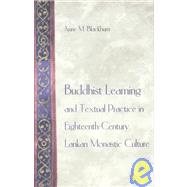Buddhist Learning and Textual Practice in Eighteenth-Century Lankan Monastic Culture
, by Blackburn, Anne M.- ISBN: 9780691070445 | 069107044X
- Cover: Hardcover
- Copyright: 5/29/2001
Anne Blackburn explores the emergence of a predominant Buddhist monastic culture in eighteenth-century Sri Lanka, while asking larger questions about the place of monasticism and education in the creation of religious and national traditions. Her historical analysis of the Siyam Nikaya, a monastic order responsible for innovations in Buddhist learning, challenges the conventional view that a stable and monolithic Buddhism existed in South and Southeast Asia prior to the advent of British colonialism in the nineteenth century. The rise of the Siyam Nikaya and the social reorganization that accompanied it offer important evidence of dynamic local traditions. Blackburn supports this view with fresh readings of Buddhist texts and their links to social life beyond the monastery. Comparing eighteenth-century Sri Lankan Buddhist monastic education to medieval Christian and other contexts, the author examines such issues as bilingual commentarial practice, the relationship between clerical and "popular" religious cultures, the place of preaching in the constitution of "textual communities," and the importance of public displays of learning to social prestige. Blackburn draws upon indigenous historical narratives, which she reads as rhetorical texts important to monastic politics and to the naturalization of particular attitudes toward kingship and monasticism. Moreover, she questions both conventional views on "traditional" Theravadin Buddhism and the "Buddhist modernism" / "Protestant Buddhism" said to characterize nineteenth-century Sri Lanka. This book provides not only a pioneering critique of post-Orientalist scholarship on South Asia, but also a resolution to the historiographic impasse created by post-Orientalist readings of South Asian history.







